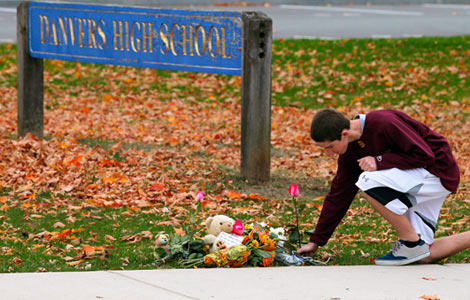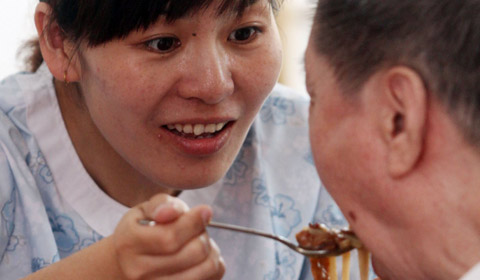Workstation to assist juvenile criminals in Shenzhen
Updated: 2013-10-24 20:50
(chinadaily.com.cn)
|
||||||||
Shenzhen Intermediate People's Court has set up a workstation for social workers to help and educate juvenile criminals.
Government officials say that in recent years, more than 30 percent of nonlocal juvenile criminals who have received a sentence that does not include imprisonment have ended up staying in Shenzhen, Guangdong province. Without supervision, the juveniles may impose a threat to public security, officials say.
The workstation, established on Oct 22, has five members, including a social worker, a psychologist and a counselor from Hong Kong.
To help teenagers on probation successfully reintegrate into families and society as law-abiding citizens, the workstation offers various services to them and their families.
For juveniles who have not yet been sentenced, workstation staff will acquire information such as the juvenile's family background, growth experience, personal behavior and repentance.
The staff will then draft reports based on the questionnaire and give them to the judge, who in turn will use the information to hand down an appropriate sentence.
Ruan Wei, a judge of the Shenzhen Intermediate People's Court, shared with media a typical case of officials' helping a juvenile criminal before the workstation was even set up.
A 17-year-old boy from Hunan province was sentenced to 28 months in prison after using violence to rob another student's cell phone. The boy appealed to the Shenzhen Intermediate People's Court.
Ruan, the judge in the second trial, and Wang Yongcai, a social worker, conducted a survey for the boy and discovered that the boy had a rough childhood.
He was kidnapped and taken into Guangzhou when he was 2; the case was solved four days later. When the boy was about 12, he got an accidental case of gas poisoning. Now the boy's parents work in Dongguan, another city in Guangdong, far from where the boy lives.
Huang Liting, a psychologist who did the counseling and evaluation for the boy, found that he was a volunteer at Shenzhen Universiade in 2011.
Because the boy's parents compensated the victim during the second trial and the victim forgave the boy, the sentence was commuted to probation. Now the boy has returned to school and is doing well.
If the judge finds that a juvenile criminal has abnormal behavior, the judge can ask for a psychological assessment report from social workers.
The workstation also provides counseling services for those who have mental stress or psychological problems.
After the sentence, the workstation makes regular call-back and home visits to those who were given a non-imprisonment sentence, helping those teenagers reintegrate into society.
Most Viewed
Editor's Picks

|

|

|

|

|

|
Today's Top News
Walmart China strategy: 110 new stores
China's GDP growth to 7.6%: Standard Chartered
Scholar looks at the kung fu-hip hop connection
Starbucks' pricing furor: tempest in a coffee pot
100,000 Strong student exchange picks first partners
Report: China could profit rebuilding US
Holiday may boost sales of new iPads
US press not so free, experts say
US Weekly

|

|















